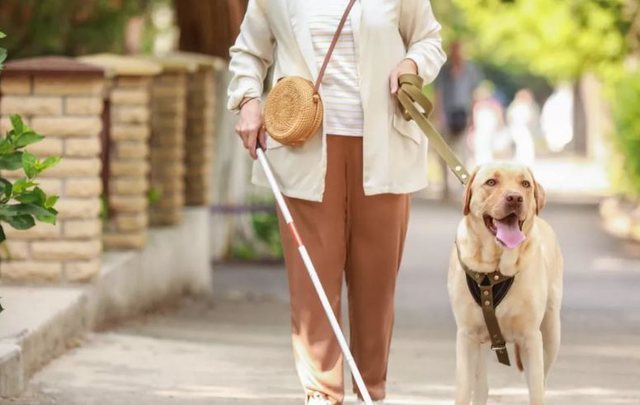
 Flash News
Flash News
Gunfire in Durres, a 30-year-old man is injured
Accident on Arbri Street, car goes off the road, two injured
Arrests of "Bankers Petrolium", Prosecution provides details: Exported and sold 532 billion lek of oil, caused millions of euros in damage to the state
Ndahet nga jeta tragjikisht në moshën 28-vjeçare ylli i Liverpool, Diogo Jota
Posta e mëngjesit/ Me 2 rreshta: Çfarë pati rëndësi dje në Shqipëri
Smart glasses and AI help blind people walk without a dog or cane

Scientists have developed glasses that provide real-time guidance to help blind people walk without assistance dogs, canes or other people.
Researchers at Shanghai Jiao Tong University in China have mounted a small computer with AI software on Google's smart glasses prototype, which was discontinued in 2023.
AI algorithms allow the glasses to observe the environment and send signals as the user approaches an obstacle or object.
"The camera can capture the image, the information in front. This image information can then be sent to a small computer," said Leilei Gu, a researcher at Shanghai Jiao Tong University.
“For example, an image of a chair tells me where the chair is, then I go to the chair, take a step, then actually the information changes because my position has changed,” he said, adding that it also updates new information about where the chair is, so the user can approach the target safety step by step.
The attached computer is as small as a credit card, allowing the user to walk around without the technology being too intrusive.
The researchers also developed 'synthetic skin', a material with built-in sensors that signal when objects are nearby.
When a user approaches an obstacle, a message is sent via bone conduction, a way of transmitting sound to the inner ear by sending vibrations through the bones of the skull.
Unlike air conduction, which passes air through the eardrum, this technology allows the listener to hear even if the ear canal is blocked.
The stretched synthetic skin is 0.1 to 0.2 mm thick, using a polymer called PDMS, but is not connected to the AI software.
"We just need to know from the side whether there is an obstacle or not, we don't care if it is connected or not, it's just to make sure it is safe," Gu explained.
About 18 people in China participated in a study.
'Massive step forward'
In Europe, an estimated 30 million people are partially sighted or blind, according to the European Blind Union. An average of 1 in 30 Europeans experiences vision loss.
The developers say that current devices are a barrier for blind people who use them, and they wanted to create a system where the user is indistinguishable from fully sighted people.
Existing options are expensive, with the costs of training a guide dog reaching up to €60,000 according to medical device industry data.
"Many people with visual impairments want to remain as independent as possible," said Chris Lewis, an independent telecom and access analyst.
"Ultimately, the ability of a camera mounted on glasses to give you information in real time is just a massive step forward," Lewis added.
He says the array of different devices using AI means the cost is becoming less prohibitive and they are being adapted for a larger market, including people with disabilities.
The research team behind the AI glasses hopes that in the future, they can develop a smaller camera that can also be placed in contact lenses./ Euronews.
Latest news










Greece imposes fee to visit Santorini, how many euros tourists must pay
2025-07-03 20:50:37
Don't make fun of the highlanders, Elisa!
2025-07-03 20:43:43
Gunfire in Durres, a 30-year-old man is injured
2025-07-03 20:30:52

The recount in Fier cast doubt on the integrity of the vote
2025-07-03 20:09:03




Heatwave has left at least 9 dead this week in Europe
2025-07-03 19:00:01

Oil exploitation, Bankers accused of 20-year fraud scheme
2025-07-03 18:33:52
Three drinks that make you sweat less in the summer
2025-07-03 18:19:35
What we know so far about the deaths of Diogo Jota and his brother André Silva
2025-07-03 18:01:56



Another heat wave is expected to grip Europe
2025-07-03 17:10:58

Accident on Arbri Street, car goes off the road, two injured
2025-07-03 16:45:27

Accused of two murders, England says "NO" to Ilirjan Zeqaj's extradition
2025-07-03 16:25:05





Gaza rescue teams: Israeli forces killed 25 people, 12 in shelters
2025-07-03 15:08:43
Diddy's trial ends, producer denied bail
2025-07-03 15:02:41

Agricultural production costs are rising rapidly, 4.8% in 2024
2025-07-03 14:55:13
Warning signs of poor blood circulation
2025-07-03 14:49:47
Croatia recommends its citizens not to travel to Serbia
2025-07-03 14:31:19
Berisha: Albania is the blackest stain in Europe for the export of emigrants
2025-07-03 14:20:19


'Ministry of Smoke': Activists Blame Government for Wasteland Fires
2025-07-03 13:59:09

AFF message of condolences for the tragic loss of Diogo Jota and his brother
2025-07-03 13:41:36
Five healthy foods you should add to your diet
2025-07-03 13:30:19






A unique summer season, full of rhythm and rewards for Credins bank customers!
2025-07-03 12:12:20

Fire situation in the country, 29 fires reported in 24 hours
2025-07-03 12:00:04
The constitution of the Kosovo Assembly fails for the 41st time
2025-07-03 11:59:57
The gendering of politics
2025-07-03 11:48:36

The price we pay after the "elections"
2025-07-03 11:25:39

Xhafa: The fire at the Elbasan landfill was deliberately lit to destroy evidence
2025-07-03 11:08:43

The 3 zodiac signs that will have financial growth during July
2025-07-03 10:48:01
Democratic MP talks about the incinerator, Spiropali turns off her microphone
2025-07-03 10:39:24

Ndahet nga jeta tragjikisht në moshën 28-vjeçare ylli i Liverpool, Diogo Jota
2025-07-03 10:21:03
Cocaine trafficking network in Greece, including Albanians, uncovered
2025-07-03 10:10:12



Korreshi: Election manipulation began long before the voting date
2025-07-03 09:39:13
Arrest of Greek customs officer 'paralyzes' vehicle traffic at Qafë Botë
2025-07-03 09:28:41
After Tirana and Fier, the boxes are opened in Durrës today
2025-07-03 09:21:10
Enea Mihaj transfers to the USA, will play as an opponent of Messi and Uzun
2025-07-03 09:10:04

Foreign exchange, the rate at which foreign currencies are sold and bought
2025-07-03 08:53:50
Index, Albania has the worst quality of life in Europe
2025-07-03 08:48:10


Horoscope, what do the stars have in store for you today?
2025-07-03 08:17:05
Clear weather and high temperatures, here's the forecast for this Thursday
2025-07-03 08:00:37
Posta e mëngjesit/ Me 2 rreshta: Çfarë pati rëndësi dje në Shqipëri
2025-07-03 07:46:48



Lufta në Gaza/ Pse Netanyahu do vetëm një armëpushim 60-ditor, jo të përhershëm?
2025-07-02 21:56:08
US suspends some military aid to Ukraine
2025-07-02 21:40:55



Methadone shortage, users return to heroin: We steal to buy it
2025-07-02 20:57:35
Government enters oil market, Rama: New price for consumers
2025-07-02 20:43:30
WHO calls for 50% price hike for tobacco, alcohol and sugary drinks
2025-07-02 20:41:53



